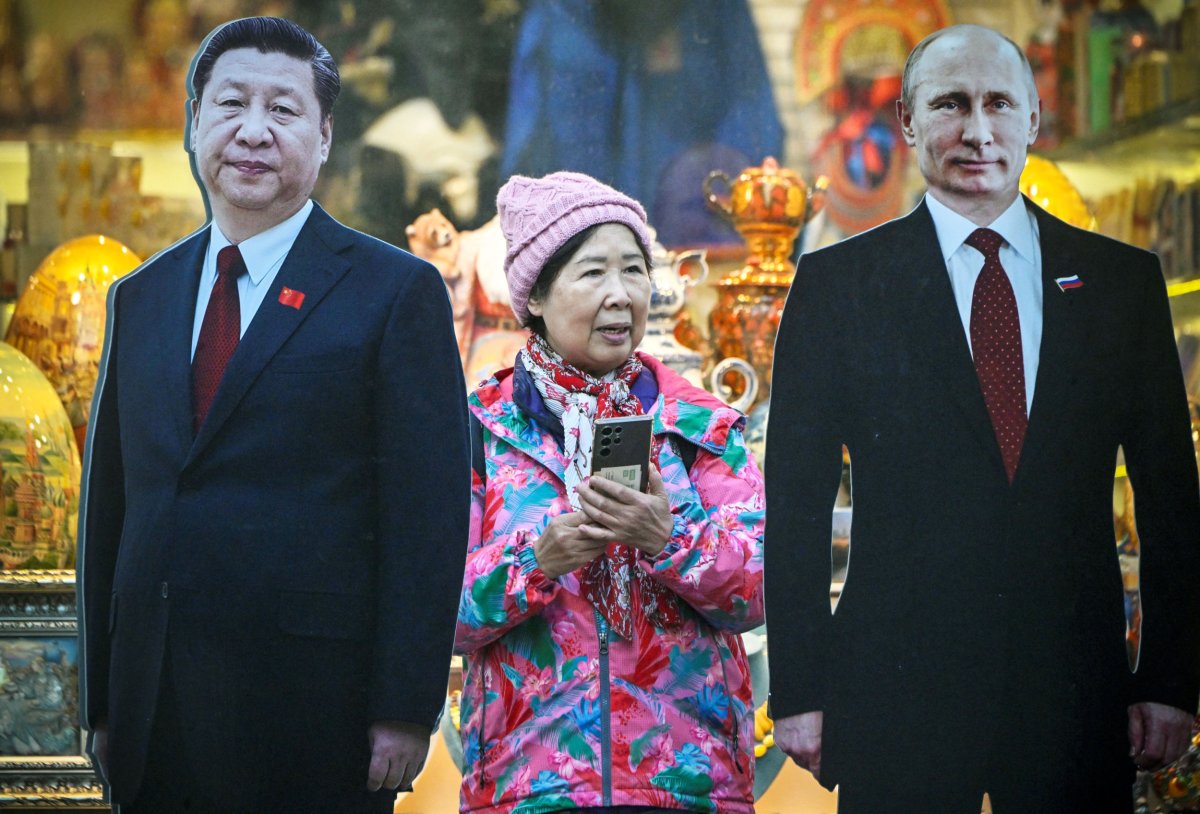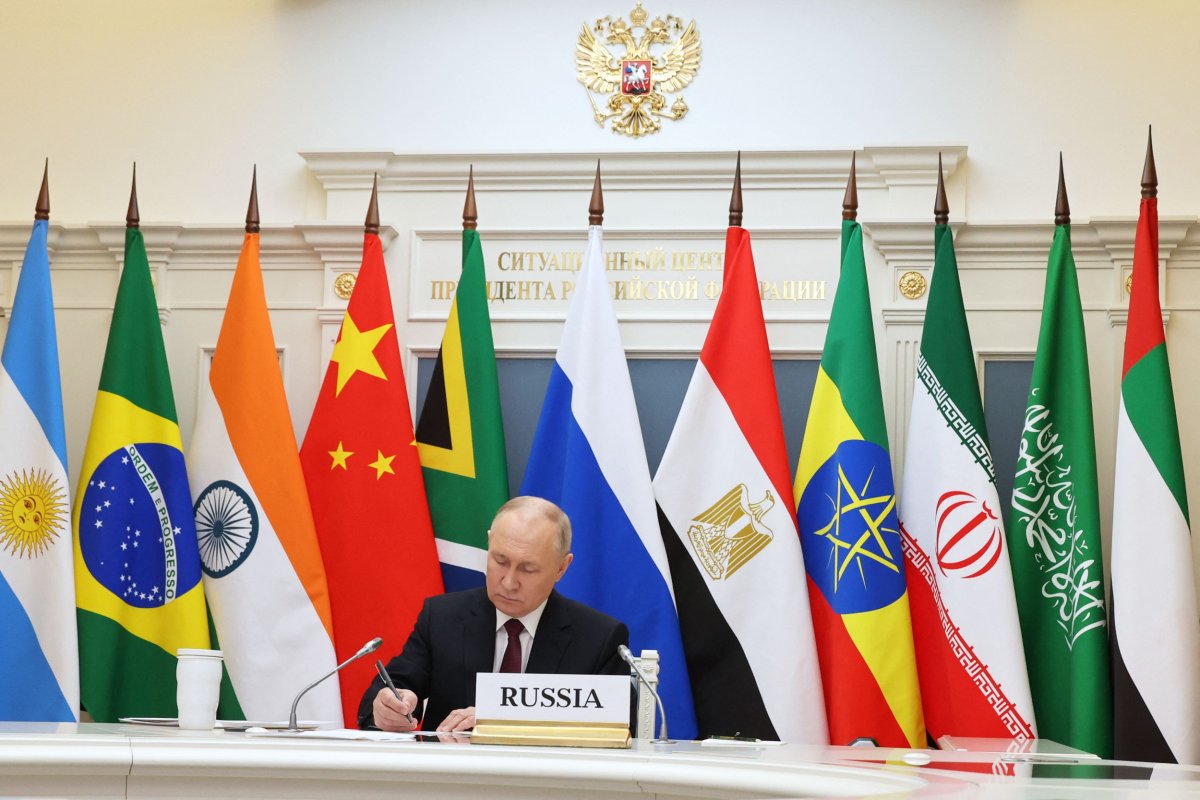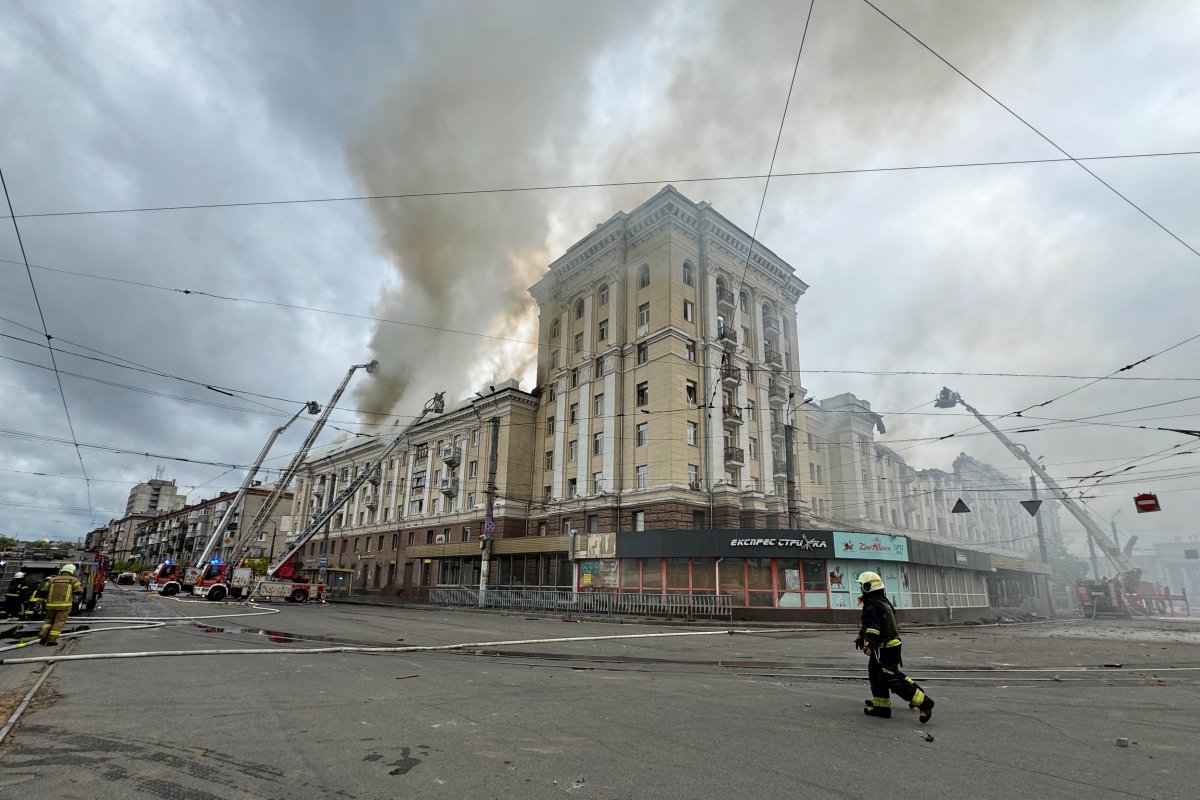The ExpoElectronica conference is a prime annual opportunity for Russia’s most advanced tech companies to make deals with the country’s decision-makers; including those in the powerful security and military sectors.
But as they assembled in Moscow earlier this month for the 2024 installment, Russia’s tech leaders—represented by 369 companies—were almost outnumbered by 348 Chinese counterparts.
The Chinese presence at the event appears another sign of Beijing’s expanding footprint in the Russian economy, particularly in advanced technology that is increasingly difficult for Russian companies to access since Moscow’s invasion of Ukraine precipitated an unprecedented Western sanctions campaign.
The trajectory is reflected in the number of Chinese and Hong Kong exhibitors at recent ExpoElectronica events. Just 119 were present in 2023, 57 in 2022, and eight in 2021.
CFOTO/Future Publishing via Getty Images
At least three companies exhibiting at this year’s ExpoElectronica have already been sanctioned by the U.S. for helping Russians evade international trade restrictions.
IMAXChip Technology was sanctioned in December 2023 for making “multiple shipments of advanced electronics to Russia,” a Treasury notice said, including to the sanctioned Akrol firm. IMAXChip has become one of Russia’s top five sources of foreign microelectrics.
Izzition E-Technology was sanctioned the same month, for its use “by the Russian government to procure electronic components.” The company deals in goods, including semiconductors, for which Russian arms are heavily dependent on imports.
The third company—Sinno Electronics—was put under measures in September 2022 because of its work with Radioavtomatika, which specializes in procuring foreign items for Russia’s defense industry. Sinno also deals in semiconductors among other electronic goods.
“Sinno, with awareness of restrictions on exports to Russia, has maintained a continuing relationship with Radioavtomatika before and after Russia’s further invasion of Ukraine,” the Treasury said in September 2022. Sinno even served as the international sponsor of this month’s Moscow event.
Newsweek has contacted all three companies by email to request comment.
‘Can’t Have It Both Ways’
Beijing’s tacit backing of the Kremlin’s war on Ukraine has deepened the divide between China and its Western rivals. President Xi Jinping has framed China as a neutral nation and potential mediator, but the growing volume of trade across the Chinese-Russian border and the use of Chinese goods by the Russian military tells a different story.
China is by far Russia’s largest trade partner, with business between the neighbors expanding to a record high of around $240 billion in 2023. Beijing has largely refused to back Western sanctions on Russia and has been cool on Ukrainian appeals to exert more pressure on Moscow to end its invasion.
China is not yet believed to have supplied military aid to Russia directly, but its companies have been credited with helping rebuild Moscow’s ravaged economy and mauled military over the past two years of full-scale war.
“When it comes to Russia’s defense industrial base the primary contributor in this moment to that is China,” Secretary of State Antony Blinken said last week. “We see China sharing machine tools, semiconductors, other dual use items that have helped Russia rebuild the defense industrial base.
“China can’t have it both ways. It can’t afford that. You want to have positive, friendly relations with countries in Europe, and at the same time, you are fueling the biggest threat to European security since the end of the Cold War.”

ALEXANDER NEMENOV/AFP via Getty Images
The issue is set to be the centerpiece of Blinken’s visit to China this week. The threat of secondary American sanctions—meaning measures put on Chinese banks and other companies interacting with sanctioned Russian entities—is reportedly already causing frictions in cross-border trade.
Some major Chinese banks have stopped processing Russian payments, while others have had to take payment through third parties. This makes trade more costly and time-consuming. Reuters reported this month that Russian companies are now facing payment delays of up to six months.
One source—familiar with the Russian defense industry and citing contacts involved in trade deals—told Newsweek that some payments to China have been delayed for more than a month.
“All payments, for everything—even for damn fruit—are bouncing,” the source, who wished to remain anonymous for fear of reprisal, said. “So, they are forced to carry bags of cash, but not all Chinese counterparts are willing to accept this form of payment.”
The Wall Street Journal reported this week—citing anonymous American officials—that the U.S. is now preparing new sanctions to be imposed on Chinese banks enabling trade with Russia. The measures, the newspaper said, are an “escalatory option” to be used if diplomatic efforts to stop the trade in dual-use goods fail.
Reuters reported “preliminarily” discussions regarding new sanctions have been held, but cited an unnamed U.S. official who said there was not yet any plan to implement them.
Newsweek has contacted the Treasury and the Chinese Foreign Ministry to request comment.
Personal Relationship
Moscow is drifting more and more into Beijing’s orbit, with French President Emmanuel Macron even claiming—arguably somewhat hyperbolically—that Russia is entering into “a form of vassalization with China.”
“This trajectory was clear before Russia’s full-scale invasion of Ukraine,” Bonnie Glaser, the managing director of the Indo-Pacific Program at the German Marshall Fund of the United States, told Newsweek. “It has just accelerated. Xi Jinping has long attached a lot of importance to his relationship with Putin.”
As Xi departed his March visit to Moscow, the Chinese leader told his Russian counterpart on the steps of the Kremlin: “Right now there are changes—the likes of which we haven’t seen for a century—and we are the ones driving these changes together.” Putin responded: “I agree.”
Glaser noted this as “an important moment” that “seemed like a very honest statement.”
The growth of this personal relationship appears to have had striking practical effects. A recent Center for Strategic and International Studies (CSIS) report on Russia’s remade defense industry shows that imports of Chinese dual-use goods spiked after the March 2023 meeting between Putin and Xi in Moscow.

ALEXANDER KAZAKOV/POOL/AFP via Getty Images
China has since become by far the largest source of such goods and, CSIS wrote, “has enabled the ramp up of Russia’s defense industrial base to the detriment of Ukraine.” On microelectrics specifically, it added: “Nearly all of the top exporters of microelectronics are based in China and Hong Kong.”
New measures may unsettle Chinese banks, Glaser said.
“If the U.S. says it’s going to target Chinese banks, no bank in the world is going to be wanting to do business with Russia,” she said. “That would be really worrisome to China’s banks. I think they’d all comply. Except maybe local banks that are not major banks and not very exposed to the international community.”
But more generally, the Russia-China alignment is unlikely to change course. Xi sees “that China is on the rise and that the West is in decline,” Glaser said.
“I don’t think he expects that that’s going to always be a consistent trajectory,” she said. “There will be ups and downs, and he has called for struggle. But he sees, I think, Putin and Russia as the only real partner that China has that can try and make adjustments to the international order and weaken the United States.”
“They don’t agree on everything,” Glaser continued of the two mammoth neighbors. “Even though I think there are people within both of those systems who are skeptical of the other country, and don’t support getting as close as Xi Jinping and Putin want to get, this is nonetheless a leader driven relationship. They are deeply invested in each other, and in each other’s major agendas.
“I think they have demonstrated a willingness to compartmentalize the things that they disagree on.”
A cooling of the relationship between Moscow and Beijing is an alluring prospect to American policymakers, concerned about a possible confrontation with China. But Glaser was skeptical.
“I think that ship has sailed,” she said. “I don’t think there’s any possibility of driving a wedge between them.”
Still, the ultimate Chinese goal remains unclear. There has been much speculation that Beijing may leverage Moscow’s increasing reliance to its own benefit. But Russian involvement in China’s priority issues—among them India, Taiwan, and the South China Sea—has been notably limited.
“The jury’s still out as to whether China ever had the intention to build leverage in order to use it,” Glaser said. “My thesis is that it’s the relationship itself that Xi Jinping wants and sees as valuable. And I don’t think he would want to use any leverage in a way that could actually weaken that relationship.”

STRINGER/AFP via Getty Images
Uncommon Knowledge
Newsweek is committed to challenging conventional wisdom and finding connections in the search for common ground.
Newsweek is committed to challenging conventional wisdom and finding connections in the search for common ground.

